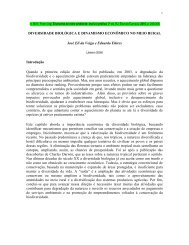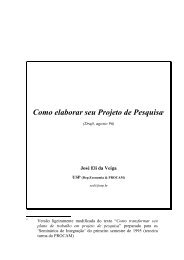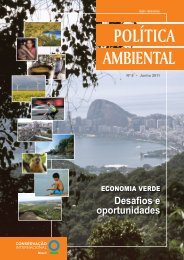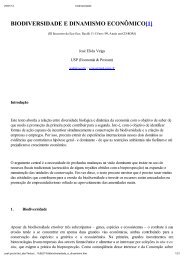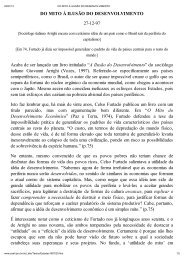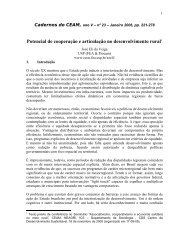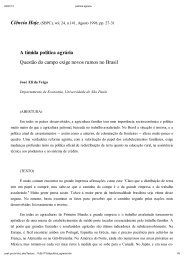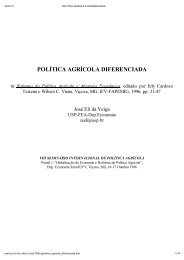sustainable development 20 years on from the ... - José Eli da Veiga
sustainable development 20 years on from the ... - José Eli da Veiga
sustainable development 20 years on from the ... - José Eli da Veiga
Create successful ePaper yourself
Turn your PDF publications into a flip-book with our unique Google optimized e-Paper software.
226<br />
4. Knowledge plurality<br />
Rural populati<strong>on</strong>s and indigenous peoples have <strong>the</strong>ir own knowledge, practices and representati<strong>on</strong>s of <strong>the</strong><br />
natural world, al<strong>on</strong>g with <strong>the</strong>ir own c<strong>on</strong>cepti<strong>on</strong>s of how human interacti<strong>on</strong>s with nature should be<br />
managed. These cognitive systems have been maintained and developed through historical interacti<strong>on</strong><br />
with <strong>the</strong> natural envir<strong>on</strong>ment, and form a holistic entity that encompasses language, cultural roots in a<br />
given place, spirituality, and “cosmic visi<strong>on</strong>”. For many cultures, what is “rati<strong>on</strong>al” or “objective” cannot<br />
be separated <strong>from</strong> what is “sacred” or “intuitive”, but is interwoven in <strong>the</strong> global perspective of local and<br />
indigenous knowledge.<br />
By adopting <strong>the</strong> UNESCO Universal Declarati<strong>on</strong> <strong>on</strong> Cultural Diversity in <str<strong>on</strong>g>20</str<strong>on</strong>g>01, <strong>the</strong> internati<strong>on</strong>al<br />
community dem<strong>on</strong>strated its commitment by recognizing <strong>the</strong> “c<strong>on</strong>tributi<strong>on</strong> of traditi<strong>on</strong>al knowledge,<br />
particularly with regard to envir<strong>on</strong>mental protecti<strong>on</strong> and <strong>the</strong> management of natural resources, and<br />
fostering synergies between modern science and local knowledge” (UNESCO, <str<strong>on</strong>g>20</str<strong>on</strong>g>01, paragraph 14). This<br />
is reinforced by <strong>the</strong> UNESCO C<strong>on</strong>venti<strong>on</strong> <strong>on</strong> <strong>the</strong> Protecti<strong>on</strong> and Promoti<strong>on</strong> of <strong>the</strong> Diversity of Cultural<br />
Expressi<strong>on</strong>s, which recognizes “<strong>the</strong> importance of traditi<strong>on</strong>al knowledge as a source of intangible and<br />
material wealth, and in particular <strong>the</strong> knowledge systems of indigenous peoples, and its positive<br />
c<strong>on</strong>tributi<strong>on</strong> to <str<strong>on</strong>g>sustainable</str<strong>on</strong>g> <str<strong>on</strong>g>development</str<strong>on</strong>g>, as well as <strong>the</strong> need for its adequate protecti<strong>on</strong> and promoti<strong>on</strong>.”<br />
This is still far <strong>from</strong> being materialized in formal intellectual protecti<strong>on</strong> systems.<br />
In additi<strong>on</strong>, <strong>the</strong> C<strong>on</strong>venti<strong>on</strong> for <strong>the</strong> Safeguarding of <strong>the</strong> Intangible Cultural Heritage, adopted in<br />
<str<strong>on</strong>g>20</str<strong>on</strong>g>03, represents major support for traditi<strong>on</strong>al knowledge as a factor of <str<strong>on</strong>g>sustainable</str<strong>on</strong>g> <str<strong>on</strong>g>development</str<strong>on</strong>g>. Under<br />
this c<strong>on</strong>venti<strong>on</strong>, <strong>the</strong> Representative List of <strong>the</strong> Intangible Cultural Heritage of Humanity recognizes<br />
31 expressi<strong>on</strong>s of Latin America and <strong>the</strong> Caribbean, of which nine are in <strong>the</strong> category of “knowledge and<br />
practices c<strong>on</strong>cerning nature and <strong>the</strong> universe” (UNESCO, <str<strong>on</strong>g>20</str<strong>on</strong>g>03). 18<br />
In short, <strong>the</strong>re is a set of internati<strong>on</strong>al c<strong>on</strong>venti<strong>on</strong>s and declarati<strong>on</strong>s 19 regarding local and<br />
indigenous knowledge, several of which have been ratified by <strong>the</strong> 33 countries of Latin America and <strong>the</strong><br />
Caribbean; and, although ratificati<strong>on</strong> by each country follows its own strategy and proceeds at its own<br />
pace, it is notable that <strong>the</strong>re is a shared internati<strong>on</strong>al framework of law to guide scientific <str<strong>on</strong>g>development</str<strong>on</strong>g><br />
and technology transfer with broad recogniti<strong>on</strong> and support for <strong>the</strong> link between <str<strong>on</strong>g>sustainable</str<strong>on</strong>g> <str<strong>on</strong>g>development</str<strong>on</strong>g><br />
and traditi<strong>on</strong>al knowledge of <strong>the</strong>ir peoples.<br />
18<br />
19<br />
Art.2.2: “N<strong>on</strong>material cultural heritage […] is manifested in particular in <strong>the</strong> following domains: […]<br />
d) knowledge and uses c<strong>on</strong>cerning nature and <strong>the</strong> universe (UNESCO, <str<strong>on</strong>g>20</str<strong>on</strong>g>03).<br />
C<strong>on</strong>venti<strong>on</strong> <strong>on</strong> <strong>the</strong> Protecti<strong>on</strong> and Promoti<strong>on</strong> of <strong>the</strong> Diversity of Cultural Expressi<strong>on</strong>s (<str<strong>on</strong>g>20</str<strong>on</strong>g>05); C<strong>on</strong>venti<strong>on</strong> for <strong>the</strong><br />
Safeguarding of <strong>the</strong> Intangible Cultural Heritage (<str<strong>on</strong>g>20</str<strong>on</strong>g>03); Indigenous Peoples Kyoto Water Declarati<strong>on</strong> (<str<strong>on</strong>g>20</str<strong>on</strong>g>03);<br />
Plan of Implementati<strong>on</strong> of <strong>the</strong> World Summit <strong>on</strong> Sustainable Development (<str<strong>on</strong>g>20</str<strong>on</strong>g>02); UNESCO Universal<br />
Declarati<strong>on</strong> <strong>on</strong> Cultural Diversity (<str<strong>on</strong>g>20</str<strong>on</strong>g>01); Declarati<strong>on</strong> <strong>on</strong> Science and <strong>the</strong> Use of Scientific Knowledge (1999);<br />
United Nati<strong>on</strong>s C<strong>on</strong>venti<strong>on</strong> to Combat Desertificati<strong>on</strong> (1994); C<strong>on</strong>venti<strong>on</strong> <strong>on</strong> Biological Diversity (1992).



